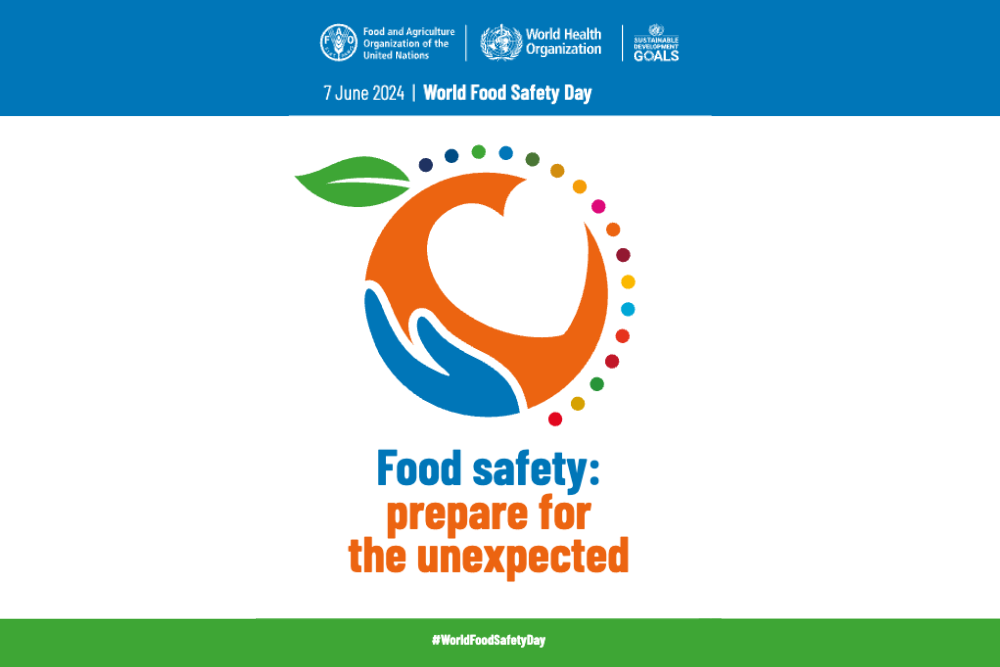World Food Safety Day 2024: Preparing for the Unexpected in Your Food Business

June 7th is World Food Safety Day - a global call to action to ensure safe and healthy food for everyone. This year's theme, "Prepare for the Unexpected," is one that is very relatable for business owners and chefs. In the fast paced hospitality world, it's not unusual for unexpected events to disrupt even the most carefully crafted operations.
Imagine a power outage during a busy lunch rush. Or a supplier recalling a key ingredient right before a weekend brunch special. These scenarios, along with natural disasters and even staff illnesses, can throw your restaurant into disarray. You can't stop these things from happening. But by implementing proactive measures and fostering a culture of preparedness, you can navigate unforeseen challenges with minimal impact on your business and, more importantly, your customers' safety.
Building a Culture of Food Safety
Food safety isn't just about following regulations; it's about creating a mindset that prioritises prevention. Here are some key strategies to build a strong food safety culture in your restaurant:
-
Invest in a comprehensive food safety management system:
Consider a user-friendly app like Chomp. Chomp provides a centralised platform for managing food safety including recording food safety incidents such as product recalls, staff illnesses, and customer complaints. This creates a clear audit trail for regulatory compliance and helps identify trends that might signal potential problems.
-
Embrace technology for continuous monitoring:
Automated refrigeration temperature loggers take the guesswork out of maintaining safe food storage. These loggers constantly monitor temperatures and send alerts if they deviate from the safe zone, even during a power outage. You will have information to make decisions on how to manage your stock. Ideally, loggers would integrate into your food safety system, giving you real-time data and ensuring you can respond to any temperature changes quickly.
-
Develop and maintain up-to-date plans:
Create clear and concise plans for various emergencies, including power outages, equipment failures, food borne illness outbreaks, and natural disasters. These plans should outline roles, responsibilities, and communication protocols for staff. Regularly review and update these plans to reflect changes in staff, procedures, or regulations.
-
Train your staff to be food safety champions:
A well-trained team is your biggest asset in ensuring food safety. Conduct regular training sessions on safe food handling practices, personal hygiene, and emergency procedures. If you're a Chomp user, utilise the food safety training modules and ensure all staff have completed the training. Equip them with the knowledge and skills to identify potential hazards, report concerns, and respond to unforeseen events effectively.
Communication is Key
Open and transparent communication is crucial during an unexpected event. Here's how to effectively communicate with your team and customers:
-
Internal communication:
Hold regular staff briefings to discuss any current or potential risks and update your team on emergency procedures. During an incident, be clear and concise in your instructions, delegate tasks effectively, and assure your team that their safety is your top priority.
-
Customer communication:
When faced with an unexpected closure or product shortage, proactively communicate with your customers as soon as you can. Use social media platforms and signage to inform customers of the situation and the steps you're taking to address it. Transparency fosters trust and can minimise customer frustration.
Risk Management: Turning Challenges into Opportunities
Unexpected events can be disruptive, but they also present valuable learning opportunities. Implement the following risk management practices to turn these challenges into opportunities to strengthen your business:
-
Conduct regular risk assessments:
Proactively identify potential food safety hazards at every stage of the food chain, from receiving ingredients to serving the final dish. Implement preventive measures to mitigate these risks and minimise the possibility of an incident. We use HACCP principles and recommend using this method.
-
Conduct post-incident reviews:
After any unexpected event, take time to debrief your team. Discuss what went well, what could be improved, and update your emergency plans accordingly. This collaborative process builds resilience and better prepares your team for future challenges.
Make Every Day a Food Safety Day
Food safety shouldn't be just one day on the calendar. By integrating the strategies above into your daily operations, you can create a culture of preparedness and minimise the impact of the unexpected.
World Food Safety Day serves as a timely reminder that even the most meticulously run restaurants can face unexpected challenges. By implementing these proactive measures and fostering a culture of preparedness, you can ensure food safety, protect your customers, and maintain business continuity even when faced with the unexpected. Remember, a prepared restaurant is a successful restaurant!
